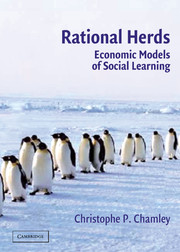16 - Financial Frenzies
Published online by Cambridge University Press: 12 January 2010
Summary
Dow 30,000
This chapter is devoted to three current research issues: (i) the integration of learning and coordination in a model of speculative attacks that is based on a Gaussian financial market with market orders; (ii) the selffulfilling equilibrium with large endogenous uncertainty and low level of trade in a financial market; (iii) the absence of common knowledge in a bubble ending with a crash.
Three issues of current research are introduced in this chapter. The first is the analysis of speculative attacks, or stag hunts in general, in a multiperiod context. The oneperiod framework of Chapter 11 does not allow for any learning from the actions of others. It seems that in a speculative attack, against a currency or in a bank run, agents observe the actions of others and optimize the timing of their actions. In Chapter 12, agents observed the actions of others, but they could not, by assumption, optimize when to invest. The optimization of timing is one of the main issues in the model of dynamic speculative attacks, which is presented in Section 16.1.
In Section 16.2, the permanent value of an asset is increasing in the number of buyers, and the uncertainty is about the number of the potential buyers, i.e., the number of agents. This positive relation between the value of the asset and the number of agents is similar to that in previous chapters when there are information or payoff externalities. In equilibrium, a higher level of purchases generates more information about a large number of agents, as in Chapter 6.
- Type
- Chapter
- Information
- Rational HerdsEconomic Models of Social Learning, pp. 358 - 384Publisher: Cambridge University PressPrint publication year: 2003



